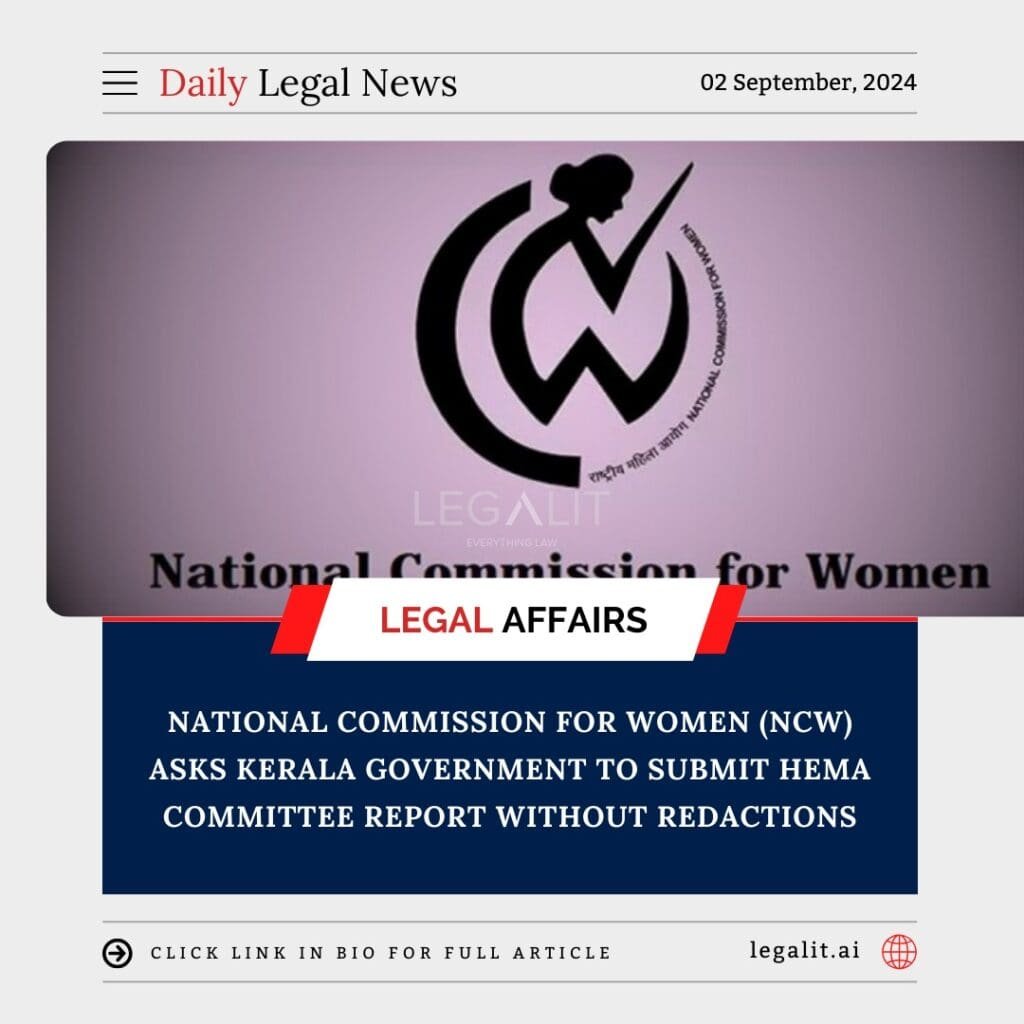
The National Commission for Women (NCW) has directed the Kerala government to submit the complete, unredacted version of the Hema Committee report, which investigates sexual harassment and exploitation in the Malayalam film industry. The request comes amid growing demands for transparency and accountability following allegations of widespread misconduct and abuse within the industry.
Background on the Hema Committee Report:
The Hema Committee, named after its chairperson, retired Justice Hema, was constituted in 2017 by the Kerala government to examine issues of sexual harassment, gender discrimination, and exploitation faced by women in the Malayalam film industry. The committee was formed in response to multiple allegations of misconduct, including high-profile cases involving prominent actors and directors, which highlighted systemic problems within the industry.
Over the course of two years, the committee conducted extensive interviews with actors, technicians, and other stakeholders in the film fraternity. It submitted its report to the Kerala government in 2019. However, the contents of the report have not been made public, and the government has only released a redacted summary, citing privacy concerns and the sensitive nature of the testimonies.
NCW’s Demand for an Unredacted Report:
- Call for Full Disclosure: The NCW, a statutory body responsible for safeguarding women’s rights in India, has called on the Kerala government to release the full, unredacted report. The commission argues that withholding parts of the report undermines the purpose of the committee, which is to ensure justice and prevent further harassment in the industry.
- Need for Transparency: The NCW’s directive is based on the belief that transparency is essential to addressing the systemic issues of sexual harassment and exploitation highlighted in the report. It asserts that a redacted version may obscure critical findings and prevent necessary actions from being taken against perpetrators or enablers within the industry.
- Ensuring Accountability and Justice: The NCW emphasized that the release of the full report is crucial for ensuring accountability and justice for the victims who came forward with their experiences. It argued that concealing parts of the report could dissuade other survivors from speaking out, fearing that their testimonies may also be kept confidential or ignored.
- Focus on Women’s Safety in the Workplace: The NCW has underscored that releasing the report aligns with its broader mandate to promote women’s safety and create a more equitable workplace environment. By pushing for the report’s full disclosure, the NCW aims to send a strong message against the culture of silence and impunity around sexual harassment in workplaces, especially in the entertainment industry.
Kerala Government’s Stance and Response:
The Kerala government, led by Chief Minister Pinarayi Vijayan, has maintained that the decision to redact parts of the report was made to protect the privacy of the individuals involved, especially those who testified about their experiences of harassment. The government has expressed concerns that unredacted disclosure could expose victims and witnesses to public scrutiny, potential defamation, or backlash.
However, following the NCW’s directive, the Kerala government is likely to reconsider its stance. It has not yet provided a formal response to the commission’s request but is expected to engage in discussions to find a balance between ensuring transparency and protecting the identities and interests of victims.
Broader Implications of the NCW’s Directive:
The NCW’s demand for the full, unredacted report has broader implications for how cases of sexual harassment and exploitation are handled in India, particularly in high-profile industries like film and entertainment. It highlights the need for transparent processes that encourage survivors to come forward without fear of reprisal or suppression of their stories.
Additionally, this move could set a precedent for similar cases across various sectors where allegations of sexual harassment have been brought to light. If the Kerala government agrees to release the unredacted report, it may pave the way for greater openness and accountability in handling such sensitive issues, reinforcing the importance of institutional support for victims of abuse.
The situation remains dynamic, with further developments expected as the Kerala government responds to the NCW’s directive. The outcome will be closely watched by stakeholders across the country, including women’s rights activists, legal experts, and members of the film industry.